Daily Kombo News Round-up 4/4/08
So, here’s some stuff I wrote. The title of this post is somewhat of a lie, as these two posts are from two separate days. Thing is, I’m still only beginning my legend at Kombo — I’ve yet to even make it out of the tutorial, much less defeat the forest temple boss or conduct an interview with it. But enjoy this trickle of content; soon it’ll pool into a flood, crashing through your expectations and blowing your mind. So un-tilt you head from the strain of reading all this slanted text and check out my news stories:
Konami Attempts to Sneak a Few New Features into Metal Gear Online, Gets Caught
THQ Looks into the Future, Sees Their Own Fiscal 2009 Line-up
And remember, Diggems the Diglet says, “Digg these stories if you like them, for they will surely lead to Kombo’s furtherance!” Meowth, that’s right!
Unspectacular Wreck Brethren
So, you’re watching your favorite TV show and the cast is huddled together on a nondescript couch with equally nondescript game controllers in their hands. From that information, you can probably deduce that they’re playing a video game, although these days, the prevalence of the Wii-mote might make that judgement a little more difficult (four-player channel changing, anyone?), but I digress.
Everything’s fine thus far, but suddenly your ears are wracked with pain, as though someone had run their nails down a chalkboard or told a Chuck Norris joke — it’s those insidious stereotypical bleeps and bloops that characterize mainstream television’s apparent grasp on video games. “Blasphemy!” you bellow, arms akimbo in a show of disgust — how can they portray gaming in a such a backward manner? In response, you do what any responsible gamer would do; you jiggle your mouse, rouse your computer from sleep mode, and surf over to your favorite gaming forum to complain. Now, here’s the clincher: would you be shocked if your fellow gamers held an opinion of gaming nearly as backward as the good people at ABC, or even Fox? Well, in a way, many of them do.
In a semi-recent post on her blog at Sexy Videogameland, Leigh Alexander had a few choice words about the appeal of Super Smash Bros. Brawl. “If I had to review Smash Bros., in other words, would you as an audience rather I factor in my emotional response to Nintendo iconography, or should I discard it as personal?” she asked. “Does your answer depend on your own opinion of the iconography?”
Leigh eloquently ponders a question that’s been surging through the gaming community as of late, mostly as a result of Smash Bros’ recent release: should character content influence reviews of a game, or should it be based solely on gameplay? Now, let’s complete Leigh’s little experiment by not only removing Nintendo characters from the equation, but the entire game altogether. And let’s replace it with, say, Portal. Should we judge Portal, a triumph of character and storytelling in games, based solely on its gameplay? Of course not.
Look at it this way: without GLaDOS’ frosting-coated morbid personality, would Valve have dedicated half of its staff to adding a trophy room to their building?* Sure, portals were a novel gameplay concept, but objectively, a two hour pack of portal puzzles hardly sounds like Game of the Year material.
And so, I believe we absolutely shouldn’t disregard characters when reviewing a game. The very idea is as antiquated as Pac Man’s ubiquitous death knell and other such sound effects. Back in the day, we could’ve flung a bucket of black paint on the original Pitfall‘s main character and there probably wouldn’t have been much of a difference — outside of the inevitable comparisons to Nintendo’s Game and Watch character, anyway. Nowadays, however, characters are inextricably tied to our gameplay experiences — Portal, Bioshock, and especially Smash Bros. are excellent examples of this. In Smash Bros’ case, does this mean a portion of the audience won’t derive full, Nintendo nostalg-tastic enjoyment out of the game? Yes, but then, someone with only a passing interest in fighting games is unlikely to ever derive full masochistic pleasure from Virtua Fighter 5, so it just comes down to different strokes for different folks.
As gaming continues to stretch its wings as a storytelling medium, the importance of characters will only grow. It’s simply a matter of time before the question asked by Leigh and like-minded gamers won’t even be a question anymore.
*I’m kidding. They’re actually constructing a new building from the ground-up.
Core in Crisis: Parts One + Two: The Complete Saga
My vision was blurry as I peered around my dimly-lit room. So far as I could tell, the morning still lingered — perched, however, on the cusp of afternoon. Drowsily, I flopped over in my bed, half-sleep finally giving way to my usual eagle-like awareness. And that’s when I saw it: my PSP, with a copy of Crisis Core: Final Fantasy VII in its disc bay and a smug air of satisfaction all about. “What have I done?” flashed through my mind as a horrified image of my face appeared in the reflection on the PSP’s blank screen. “Patapon will never forgive me, and oh, what will Final Fantasy XII and Tactics think?!”
Utterly distraught, I fled from the room into the only haven nearby, the men’s bathroom. Moments later, I found myself gazing into the bathroom mirror, wondering how this all went down.
Things began innocently enough; my roommate was hanging with Patapon for the day, so I decided to head over to Gamestop, with the intention of chatting with the guys (read: store clerks) and maybe downing a few demos. Nothing incendiary or self-destructive. As I strode through Gamestop’s transparent door, though, my plans experienced a mid-season rewrite. Crisis Core: Final Fantasy VII was the life of the party, displaying itself prominently all over the store. Nope, not a hint of modesty there. Without even noticing, I began to ponder my options.
I wondered if Patapon was really the game for me, whether it could really make me happy. Sure, it’s a great game and all, but what about my needs? I’ve always been a role-playing game guy at heart, and Patapon only provides the bare minimum of role-playing elements and zero overwrought drama. My life was in need of a shake-up, and Crisis Core was a seismic movement worthy of an excited write-up in a Japanese newspaper.
My rash actions did not go un-rewarded.
Crisis Core and I spent hours together, late into the darkest depths of the night. It taught me so much: how an RPG can be designed with a portable system in mind; how action-RPGs can be more enjoyable than traditional RPGs; and even why many Final Fantasy fans love Midgar and its ridiculously attractive denizens so very much.
Crisis Core is, of course, a spin-off of Final Fantasy VII. Last time we heard such words thrown (carelessly) together into a sentence, we got this, so you can see why I’d be a little wary of venturing into FFVII territory. Also, it doesn’t help that the original FFVII is as massively overrated as Cloud’s sword is, well, massive. But somehow, Crisis Core manages to do things right, most noticeably thanks to its main character, Zack.
Zack is the anti-Cloud; he’s loud, brash, exuberant, and a little dense. So basically, he’s a really fun character — a trait that Cloud tried his best to stifle, not just in himself, but in FFVII‘s entirety. However, in Crisis Core, Zack’s bull-headed determination to become a hero lends the game a light-hearted tone that still knows when to recede in favor of more serious fare. Ultimately, the plot is well balanced, which is more than can be said for FFVII. Equally interesting, Crisis Core paints a near-human picture of series baddie Sephiroth. In fact, the game centers around his “only real friends” and had me empathizing with him in a way I never thought possible. It’s funny to think he had a life before becoming a once-thought-dead-but-really-just-a-psychopath, but Crisis Core will clear up any misconceptions you might’ve had.
While Midgar’s vibrant characters and somewhat dystopic setting are certainly impressive, Crisis Core‘s mission structure is the real draw. See, generally, when an RPG is released on a portable system, it apes the structure of a console RPG dungeon for dungeon — which is to say, it’s not conducive to a portable experience. Say you’re spelunking one such dungeon while taking the bus to work. It’s been about half-an-hour since you were last embraced by the warm glow of a save point and you’re getting a little antsy. Now you can see your workplace approaching, growing from a tiny spec on the horizon into an actual building. You become frantic. If you don’t save, you’ll have wasted the past 30 minutes and you’ll have to solve that annoying puzzle all over again. But then it’s too late; the bus screeches to a halt and you stumble to your knees in defeat, ruining your good pants in the process.
In Crisis Core, this isn’t a problem. Save points are placed liberally throughout the game world; and, even better, they allow you to access hundreds of bit-sized missions anytime you want. Each 3-5 minute mission tasks you with fighting some enemies and rewards you generously. So yes, they’re totally worth your time, bus ride or no. But even in the cases of the game’s larger story-based missions, you won’t feel bogged-down in pointless drudgery. With many typical RPGs, dungeons feel like bridges between story events — bridges that take hours to cross. Take a few steps, random battle, push some blocks, repeat — only a few exemplary games rise above this generic structure. Crisis Core cuts away the fat, leaving you with larger missions that don’t indulge in an eternity’s worth of tedium. They focus on combat, while seamlessly integrating the game’s enthralling plot into every figurative orifice imaginable.
And that’s what takes the game still another cut above most other RPGs: its tight, yet tasteful usage of storyline. It’s no exaggeration to say that story pervades Crisis Core. For one thing, the game utilizes a sort of text-messaging system (Square Enix has to keep up with Japanese trends somehow) that feeds you tiny bits of information which serve to flesh out the game’s world. It’s a fairly organic system along the lines of Mass Effect‘s planet descriptions or Elder Scrolls IV: Oblivion‘s books — it gives the player the option of delving into the depths of the game world in a way that cut-scenes can’t.
That’s not to say that cut-scenes get the shaft or anything — far from it. They’re everywhere. As with many other aspects of the game, however, they’re short and quite compelling. During larger missions, cut-scenes break up the action and provide the player with an incentive to keep playing. In that respect, the game creates a sort of carrot-on-a-stick mentality in the player that’ll see many a PSPs’ batteries dying before their players’ drive to continue bites the big one.
These cut-scenes serve another purpose as well; they pull your attention away from the game’s solitary nature. As I mentioned earlier, Crisis Core casts you as Zack, and only Zack. You don’t have a party, and as such, similarities can be drawn between Crisis Core and single-player hack ‘n’ slash dungeon crawlers. In a hack ‘n’ slash, about all you have to keep you company are the ominous roars of vicious monsters, as well as the monsters themselves, and it gets a little lonely. Crisis Core never allows solitude to dishearten you, as cut-scenes, which tend to involve other characters, abound. Even while in battle, Zack has flash-backs to his encounters with other characters, which also activate special Limit Break abilities. It’s a masterful little one-two punch that shows how carefully Square Enix designed the game.
Really, I can’t recommend this game enough. If you own a PSP, buy it. If you don’t own a PSP, I hear kidneys are going for a nice sum right now, so there’s always that option. Alternatively, you could just wait for the inevitable PS2 port of the game, but Crisis Core is one of the few high-profile PSP games that wasn’t designed as a tiny PS2 game. Also, waiting sucks.
(Note: Objects in the pictures may look prettier than the Crisis Core appears. The game’s still pretty though.)
Patapons, Zigotons, and Everything In-Between
The other day, I went out to lunch with my mother in penance for being such an absentee son. After waxing ridiculous about IHOP’s Horton Hears a Who cross-promotion (pancakes that secrete pink and blue something, and Sprite mixed with insoluble hard candies), I attempted to explain Patapon, a game on the PSP, to my mom. Understand that, under normal circumstances, I wouldn’t have even given thought to such a feeble gesture, but having only just discovered Patapon’s joys mere minutes earlier, I was determined to spread the word.
As you probably expected, the end result was disastrous. She thought the game’s concept sounded weird and lame, and I was sadly without disciples for my Pataponian movement. Well, having invested a little more time in the game, I’ve now realized that, contrary to the results of my lunchtime escapade, Patapon is an excellent title for those hard of gaming. At the same time, however, it’s unfortunately incapable of reaching many of those people.
So, you’ve stuck with me this long; I think it’s time to actually explain Patapon. It is, at first glance, a simplistic rhythm game wherein you guide a handful of eyeball people by banging on ethereal drums. Now, I’ll admit that this concept sounds extremely odd, but it’s really fun! Basically, you’re a god of sorts, and each “pata” and “pon” of your drums drives your tribe of eyeball people forward. And they really are a tribe: they utilize primitive weaponry, display the heads of their fallen foes for all to see, and practice voodoo magic (that actually works).
Sounds creepy, right? Wrong. Patapon is wrapped in the most tasteful candy-coated aesthetic I’ve ever seen, and without it, the game would fail. Each tiny tribesman is uniquely adorable, and even the game’s Jurassic-sized bosses, at their fiercest, look fit to be Barney the Dinosaur’s rebellious cousins. But while the graphics are stunning in their simplicity, they’re far from the main attraction. That honor goes to the music, which takes the form of initially simple chantings composed on-the-fly by your characters.
It’s no exaggeration to say that these chantings are the core of the entire game. Each time you beat out a simple pattern on your drums (controlled by the PSP’s shape-themed buttons), the game’s music takes an upswing. Soon, your little army gets so riled-up that it enters Fever mode and begins shredding through all that gets in its path, causing your enemies to rue the day the were born into a strictly two-dimensional world. All throughout the madness, however, you have to keep up with the rhythm; every few seconds, “pata pata pata pon” must rebound off your drums or else your army will literally lose its rhythm and fall to the ground. As you can imagine, it takes a fair amount of concentration for something that seems so simple. But that’s why Patapon is an ideal non-gamer’s game.
See, thus far, I’ve only given you the skinny on Patapon’s basic gameplay — something so basic that you need only one hand to play it*. With hardly any previous gaming experience, a soccer mom, businessman, or annoying younger sibling would find themselves comfortably fitting into Patapon‘s addictive stylings. But with a wee bit of digging, they’d discover something truly deep.
For one thing, Patapon isn’t simply about moving and attacking. There’s defending, too. End of paragraph. It’s about managing the ebb and flow of those advances. If you advance at the incorrect time, you’ll find yourself falling to the slings and arrows of outrageous, well, slings and arrows. In addition, at a point in the game where you should be sufficiently skilled in managing the battle’s flow, Patapon introduces you to miracles. Since you’re a god, it only makes sense that you’d get a few perks aside from banging on the drum all day, and miracles fit the bill. They come at a cost, however: Fever. As an example, one miracle allows you to call down rain from the heavens — subsequently putting out fires and making your eye-tribe’s mascara run. But what happens when a boss sets your army on fire? Do you allow your devoted followers to suffer a hell on earth in order to do more damage to the boss, or do you put out the fire in the hopes that causalities will be lessened? And all the while, “pon pon pata pon.”
“But what’s so important about casualties?” you ask. Well, at first, nothing. Here again, though, everything’s simple at first; the game only teaches you things when you’re ready. Soon though, you gain the ability to grow patapons from a suggestively-shaped tree at your home base. With each mission, you’ll collect new parts to use in the genetic recombination process, while offing the patapons that no longer fit your needs. Before long, you’ll find yourself growing attached to your ultimate eyeball fighting force, especially once you start decking them out in cute little weapon sets. Needless to say, losing your team won’t merely cause emotional damage, as a well-bred army is far more powerful than a normal one.
At this point, you’re probably thinking that Patapon is prohibitively complex — like a high-level game of Magic: The Gathering or Dungeons and Dragons. But in reality, Patapon is more like a rhythmic version of chess — a game with simple concepts and intricate possibilities. In fact, you can ignore much of the army customization and be ok; the game even auto-optimizes your army’s equipment if you so desire. The other complexities fall into place like new pieces in Tetris; they just make sense.
These complexities, ironically enough, are the main reason Patapon is such a great non-gamer’s game. Sure, many other games fit the bill in more traditional ways, but Patapon is progressive. By melding the ingrained human concept of rhythm with full-blown RPG and strategy elements, Patapon forms an exquisite bridge between gaming’s two diametrically-opposed sides. It can lure non-gamers in with simple charms and then introduce them to the basics of hardcore gaming’s favorite genres. There’s one caveat, however: in order to really understand Patapon, you have to play it. It’s a shame, then, that the people who would most benefit from Patapon are the most likely to miss out on it. But like the patapon, we can prevail over this issue. We must band together and spread the good word. For if not gamers, then who?
*Next time on Vahn16’s Blog: Why Patapon is a great game for pirates
Something Different
I’ve been sitting here and trying to figure what to write about for the past half-hour or so, but nothing comes to mind. I fear I’m suffering from some writer’s block, as my hulking genius brain can’t seem to spit out any inspiring ideas at the moment. So today, I’m going to try the eponymous Something Different. Basically, I’m just going to write about whatever comes to mind, with little heed for rhyme or reason (don’t worry, you two will have your chance again in future writings).
I’m a strong proponent of the idea that our habits in hobbies tell us things about our habits in more important settings. For instance, today, when presented with the opportunity to dig further into Patapon (a quirky rhythm-strategy title that I’ll talk about in the future) or continue my Crystal Chronicles, I instead chose to play Lost Odyssey — a traditional JRPG if there ever was one. What does this say about me? I’m averse to breaking out of my box.
Sometimes, an inexplicable melancholy (thank you for that word, Daniel) sweeps over me, and I think it is in part due to my box-dwelling nature. See, I start feeling lonely and think things like, “Well, maybe if I had more friends…” Then I think things like, “That’s dumb. you only need one or two close friends to be happy; be satisfied with what you’ve got” and “Oh crap, I just took out a row of traffic cones, didn’t I?” Now, in part, I think we’re all prone to this line of thought. We always want more no matter how much we have.
And hell, even the most adventurous person needs a little comfort food every once in a while; as a couple of friends and I were discussing the other night, just look at how ethnically divided Austin College sometimes seems. At its basest, our box can even involve physical features, regardless of personality traits.
So, I guess it’s a matter of social satisfaction vs. purposeful insularity — or at least, those are two ends of a multi-parted scale. (Remember, no reason.) In my case, I occasionally feel dissatisfied with my social life, so I desire to meet new people — sometimes. At the same time, however, I don’t even know if I need to break out of my box or if I stand to gain much from doing so. And, of course, I’m scared. Thus, I keep inside my own little world. My reasoning is as such: Why try to gain more friends when my ability to have fun is inversely proportional to the number of people around me at once? As the number of people swells, my comfort level takes a nose-dive. Why do we make friends? For support, sure, but primarily to have fun. Well, look at that, I do believe I’ve made somewhat of a point.
And that’s today’s lesson in Introversion 101. Homework for next class is non-existent, as its Easter weekend and I’m being nice.
Hm. I sort of like this idea — psychological profiling based on gaming habits — although my execution was akin to Pearl Harbor if kamikaze planes were inane ideas. Still though, I might try it again, but with more organization and a less selfish slant.
So, let’s offset the egotism with some Q&A: Are you stuck in your box? Do you constantly seek to make new friends? Well, call our toll-free number. Or are you a bubbly extrovert who’s personality seeks to consume the meek among us? Although if that’s the case, you’re less bubbly and more of a cannibal. Seriously, get help.
Well, I should probably call it quits before this gets even stupider. Hopefully I’ll stop meandering around in the slums of writing and actually produce some decent content tomorrow. We can only hope.
Gaming Diary: "I was doing it before Stephen Totilo" Edition
Final Fantasy Crystal Chronicles: Ring of Fates
Finally, I’ve started this game after owning it for nearly a week. It’s not a normal plot-heavy, pretty-boy filled Final Fantasy, but instead opts for a light plot about normal children. Nope, no outlandish hairstyles here.
Well, this was the situation I was presented with about five seconds into the game. The children were being taught how to heft a blade by their father. So far as I could tell, this “rite of passage” was actually a thinly-veiled attempt on the father’s part to rid himself of a reviled chore (chopping the firewood), but I’m not here to judge.
After the children were unable to make the blade so much as budge, two more characters showed up; they had names, but I’m fairly sure they were actually Yachiru from Bleach and a new type of Heartless from the hypothetical Kingdom Hearts III. They began talking about magic and I began wondering if Ichigo could take Ansem in a fight. Once they finished talking, the children lifted the blade through teamwork; this, of course, was an allegory for the multiplayer aspect of the game — it’s Square’s way of saying, “Please try playing multiplayer. The bucket’s gone. We promise.” And if that doesn’t work, they force you to notice multiplayer through your total inability to pause in single-player. Urgh.
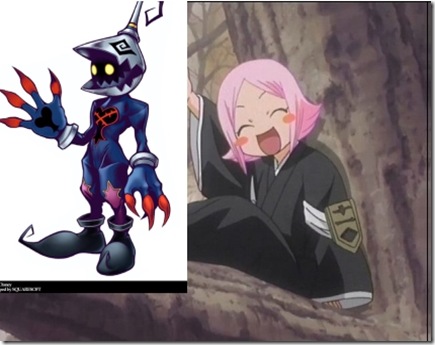 Yes, I’m fairly sure this is exactly how it happened.
Yes, I’m fairly sure this is exactly how it happened.
With blade in hand, the young boy (of the brother-sister duo) ran away to Danger Cave while his sister suggested that adventure is dangerous. Japanese cultural undertones? Well, let’s put it this way: that girl is cruisin’ for a kidnappin’. Inside the cave, the boy was greeted by a moogle. The moogle’s entrance was punctuated with a giant crash — right through the fourth wall. He delved into the basics of the game’s controls and asked repeatedly if I’d like hear them again. Oddly enough, I was unable to perform attacks myself when the moogle was teaching me. And no, I don’t suck; I mean I was physically unable to perform them. Instead, my character just did them himself while I, in my total powerlessness, looked on.
Once I took back the reigns, things went smoothly. Interestingly (at least as far as hack ‘n’ slash RPGs go) I was able to jump onto enemies’ heads and box them around the ears — by which I mean stomp on them. While playing Halo I’ve always taken great pleasure in doing head-stands, in spite of the fact that they don’t do any damage. But for some reason, now that they’re useful in FFCC, the childlike joy just isn’t there anymore.
For the most part, Danger Cave was empty. Sure, angry animals appeared and scratched at my character in a fruitless attempt to reclaim their home, but the cave’s original inhabitants were long gone. I soon discovered why: Those cave-dwellers were fairly advanced all right — they even had their own transportation system. But in their race towards technological superiority, they hamstrung themselves. Put simply, their train tracks were a bust. There was not a train to be found — only blocks. If only they could’ve known the error of their ways! But hey, at least it provided me with a quick block-pushing brain-teaser.
The cave’s final room presented me with a real challenge: a Transformer. As soon as I approached what appeared to be an innocuous coffin, it morphed into a robot scorpion. “Have no fear,” my character quipped, “its pointy, giant tail is its weak point!” I’d hate to see what’d happen if this child tried to subdue a real scorpion. Against all odds, however, I prevailed, and my character decided it was time to call it a night.
Metric Snarkton of sarcasm aside, I’m liking this game pretty well so far. It’s technically sound — even beautiful in some areas — and mechanically enjoyable. I doubt the story will hook me, but for once, that’s not why I’m playing a Final Fantasy game*.
*FF XII and FF: Tactics fall under this category as well, but that’s neither here nor there.
Passive Complacency
How many movies have you seen in the past month? Probably more than me, as, unless you count quickly glancing at the cover of Solaris, I haven’t seen a single one. So I got to thinking about my plight and realized something: movies, in my mind, are time-wasters. “Oh-ho-ho,” you retort, “aren’t videogames, sci-fi books, rock music, and breathing (my order of priority, not yours) also time-wasters?” Kinda. Recently, I’ve taken to believing that videogames have cheapened all passive media for me. Why blankly stare at something when you can blankly stare at it and press buttons? Or at least, that’s how I rationalized it.
A couple of days ago, however, I started back into Children of the Mind by Orson Scott Card, a book which I started over Christmas break, but that post-break schoolwork prevented me from finishing. Well, I’m completely enthralled, and my “active media = winnar” theory is looking for a new job. The book’s story is wonderfully intricate and my blind devotion to Ender and his compatriots probably hurts my objectivity just a tad.
Luckily, I managed to escape Children‘s gravitational pull just long enough to pick up another forsaken tale, Lost Odyssey on the Xbox 360. After fighting the abominable snow raptor, the game’s cast was thrust into a beautifully orchestrated show of political intrigue as well as a fight against some robots. The point is, Lost Odyssey‘s story managed to captivate me as well, but — by virtue of its being a steampunk-fantasy romp — in a different way.
Hooray, I just proved that passive media and active media both have their places — of course, I also discovered fire when I looked in my gas-powered fireplace yesterday, so I’m a king among pioneers.
There’s one sticking point, though. The fact is, Lost Odyssey‘s gripping plot is portrayed through dramatic camera angles, uncontrollable events (why did we allow two children unquestioned access to a monstrous train?), and other such cinematic techniques. Yep, it’s just like a movie. (I swear, this argument is becoming so circular that I can probably make it spherical with a little more effort.) So then, if this is the case, why do I refuse to watch movies? Is it because I like having illusory control over the cast in what is essentially an interactive film? Or maybe I’m such a misanthrope that I can’t stand the sight of real actors and need polygonal models instead. Maybe I’m afraid of losing my virginity in a dimly-lit movie theater. Who knows? But we can all be sure of one thing: It’s not because I’m too damn lazy to pry myself away from my chair and check out the latest box office smash. It’s because I’m a Facebook addict.
Sins of a Solar Egomaniac
My list of “Things to Do” has many entries; among other things, I’d like to complete a triathlon, run 50 miles, and then do both while not dreaming. But in the foreseeable future, I have one real goal: to play an RTS (real-time strategy) for a significant amount of time.
My ongoing quest to deprecate myself has revealed a startling inadequacy. The only three RTSes I’ve ever finished are Warcrafts I & II and Starcraft. The fact that I’ve never attended a Blizzcon is more than a little startling, but I digress.
Upon noticing my lack of RTS literacy, I began a journey of introspection. The journey lead me to the depths of my soul and back, so it took about five minutes. While down there, I made a connection between RTSes and RPGs; see, both genres are prohibitive — that is to say, they’re complex to the uninitiated. But that’s where the similarities end. Accordingly, I sit on the RPG side of the wall, and so far as I can tell, not even Ronald Reagan would be much help in tearing down the divide.
RPGs, with their number-crunching character creation and intricate battle systems, can be just as complex and diverse as RTSes. So why do I love one and loathe the other? In both genres, you must take time to learn the ins-and-outs of each game within those genres. For instance, superficially speaking, Rise of Nations shares little in common with Starcraft outside of resource management. Similarly, Lost Odyssey and Mass Effect share the same engine, but that’s where they draw the line. Yet, in both genres there exists a lexicon of gameplay techniques and ideas — learned instincts, if you will — that most every game shares, but puts its own spin on. It would seem then, that during my vital mental development phases, I was exposed to the RPG, while the RTS was shunned. Where language fell in all this, I don’t know; but I talk good, right?
On multiple occasions, I’ve attempted to dig into an RTS here or there. Each time, however, I scarcely make it out of the tutorial. It really is akin to learning another language, one spoken through mouse clicks and keyboard strokes. And like a lazy high school student, I just can’t pick it up. This time, however, will be different; this time, I’ll succeed.
So what is “this time”? Well, on the recommendation of a friend, I’m playing Sins of a Solar Empire. For those who are “in the know,” this probably seems like a bad introductory RTS. But as much as I may seem like a crazy person — sometimes even muttering irrelevant asides at random times — I have a reason.
Computer Gaming World (now Games For Windows) has always been one of my favorite magazines. Each month, they run a “column” called “Tom Versus Bruce,” wherein the eponymous Tom and Bruce clash in a PC game of their choosing and then chronicle their adventures. The column is uniformly excellent, but it reaches ZOMGAwesome levels only when RTSes are involved. I mean sure, just like most other games, RTSes have their own stories and backdrops, but when multiplayer is involved, the game’s main plot ceases to be the focal point. Instead, the story of two players locked in an ever evolving war blots out all other factors. This may not sound like much — all multiplayer games do it to an extent — but in RTSes, there are so many factors to consider. So, when my friend told me about Sins of a Solar Empire‘s sometimes month-long skirmishes, I was enthralled. How’s this sound: You’re beaten back to your main planet, and all hope seems lost. An armada of enemy frigates is in mid-jump space (or slip-space) and your planet is the trampoline. But then, just failure looms imminent, an even larger armada of your own ships jumps in from way across the galaxy and saves the day. A victory that sweet is sure to give you amazing satisfaction. And diabetes.
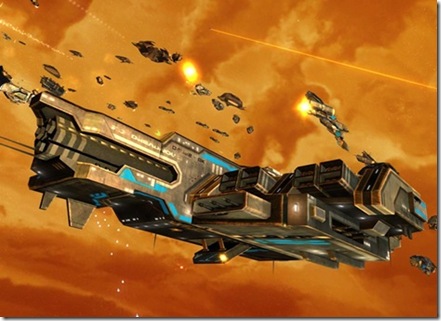 Sins is also extremely pretty. If it were a girl, its milkshake would most assuredly bring all the boys to the yard.
Sins is also extremely pretty. If it were a girl, its milkshake would most assuredly bring all the boys to the yard.
It was with hope for that kind of valiant struggle that I booted-up Sins. Frankly, a single word can describe the game: daunting. Complex tech trees grow from every figurative orifice Sins posseses, and their bark is nearly impenetrable. Additionally, along with normal resource gathering, you have to tax the planets under your rule. And not only do structures produce units; units produce other units. My brain just winced. The game seems like a 4X turn-based strategy, but in real-time. This, of course, gives the game a unique pacing that allows for strategies suitably complex.
All things considered, Sins seems loaded with potential. Hopefully once I move beyond the first two tutorials (say that five times fast), it’ll prove me correct.
Sorry
Yeah, the blog’s been a bit sparse in terms of content lately, and I’m sorry. Exciting things are happening, but I’m not quite ready to talk about them. Put simply, you’ll be reading a lot more from me soon. For now, though, I imagine I’ll have something new for you to read tomorrow or Sunday, so rejoice and stuff. In the meantime, this:
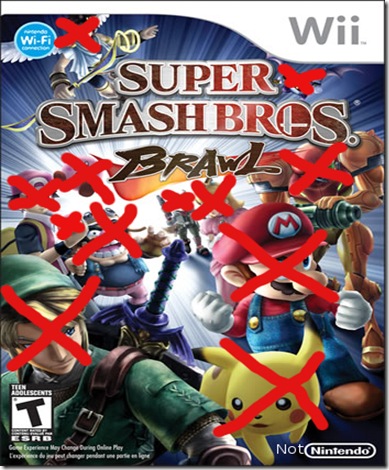
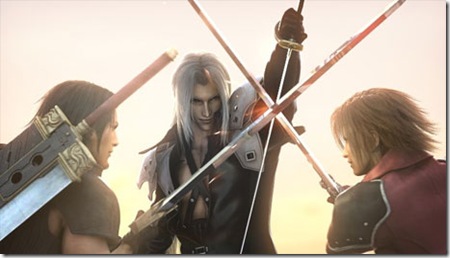
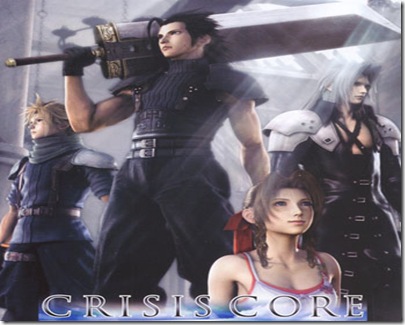
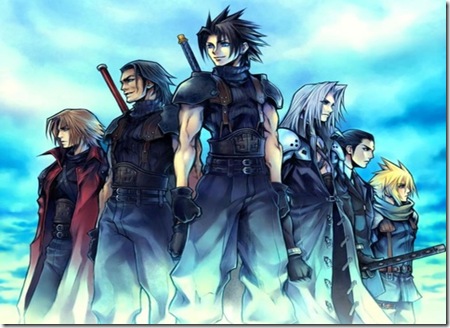
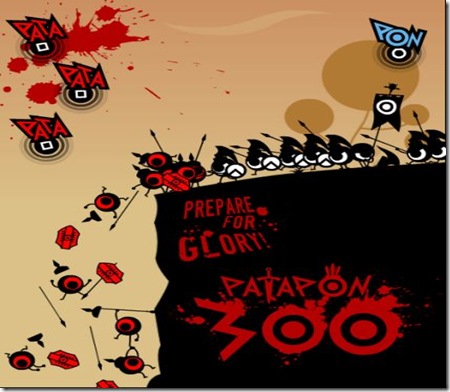
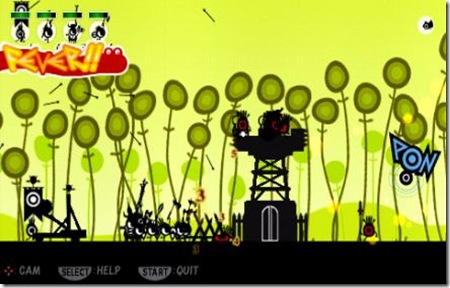

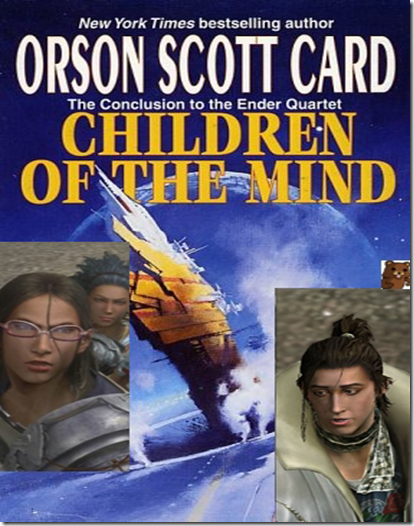
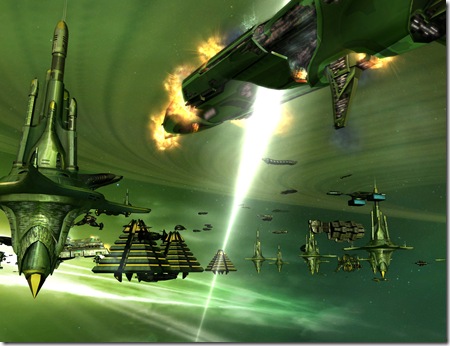

Director’s Commentary: Apollo Justice: Ace Attorney
March 11, 2008 at 10:27 pm (Director's Commentary)
Time for another look inside the world of amateur game-reviewing — this time through the lens of a review of a game about Apollo Justice: Ace Attorney. And now that you’ve waded through a sea of prepositions, enjoy the show.
Oh, This week, I’m going to try streamlining the format somewhat. Essentially, it’ll be in the same order as the review itself, but with a little twist. Tell me if you like it.
10:07 PM: As soon as I happened upon my review’s published form, I noticed something was amiss. After much analysis, I confirmed what I already knew to be the truth before the analysis: my intro paragraph had been altered. First, the Worthplaying version:
“Given some of Capcom’s long-standing franchises — Breath of Fire, Devil May Cry, Mega Man, Onimusha and Resident Evil — one could say that Capcom likes its sequels. Sometimes, as with Resident Evil 4, Capcom graces us with a radical step forward that not only serves the series well but also advances the genre as a whole. Not every fourth game can be RE4, but Devil May Cry 4 is dumb, action-packed fun that definitely hearkens back to the DMCs of yore, only with a new cast of characters and an emotionally fueled story. That’s essentially what you’re getting with Apollo Justice: Ace Attorney: Apollo and company take Phoenix’s spotlight, just as Nero did Dante. Fortunately, just as Nero was a worthy successor to Dante’s wild legacy, Apollo is a fine addition to the now-legendary Wright & Co. Law Office. Too bad it’s not exactly what Apollo was expecting ….”
And here’s its long-standing rival, my original version:
Mega Man, Resident Evil, Devil May Cry, Breath of Fire, and Onimusha – if you think I’m listing excellent Capcom series, you’re only half-right. Each of those franchises has another, somewhat obscure commonality when matched with its brethren: the number four. See, Capcom likes its sequels, and could even be accused of succumbing to sequelitis, but only up to a point. That point tends to be the fourth sequel in a series; Capcom then re-invents said series with surprisingly consistent quality. Beyond that, however, these “oddball” sequels are all over the place. Sometimes, Capcom graces us with a radical step forward for not only their series, but for a whole genre – ala Resident Evil 4. Sadly, not every (fourth) game can be RE4, but hey, Devil May Cry 4 is dumb, action-packed fun, right? And it definitely harkens back to the DMCs of yore, but with a new cast of characters and an emotionally-fueled story. With Apollo Justice: Ace Attorney, that’s essentially what you’re getting; Apollo and company take Phoenix’s spotlight, just as Nero did Dante. Fortunately, just as Nero was a worthy successor to Dante’s wild legacy, Apollo is a fine addition to the now-legendary Wright & Co. Law Office. Too bad it’s not exactly what Apollo was expecting…
The WP version is obviously streamlined, but once you hit the “Not every fourth” line, things get a little messy. In my opinion, without all my talk of fours, that line seems abrupt and unexpected. If “Not every fourth” was changed to “Not every sequel,” it would be better, but I actually like my original here. Surprise, surprise.
Friday, March 7, 11:08 PM: It seems I’m slowly descending into review reviewing madness, and it’s causing a flashback. See, when I first began to contemplate this review, I wanted to do something different. Quite frankly, the traditional review format is boring — each time I write a review about “graphics, gameplay, story, etc,” it’s like I’m constructing a new sand castle with the same bucket I used on all the other sand castles. Sure, the castle can have its own arrangement and size, but eventually, all of the castles begin to look the same. Thus, I fooled with the idea of adding a little New Games Journalism to the sand and water in the form of a “Capcom Meter”. The plan was to judge each aspect of the game in comparison with Capcom’s other fourth iterations in certain series. After realizing how redundant — and pointless — that idea was, I converted my giant-brained thoughts on the subject into the DMC4-Apollo Justice comparison now present in the intro.
10:140/4: “After an opening court case that will have you sweating, thanks to the story revelations and unusually high difficulty level, Apollo becomes the official defense attorney of Wright & Co. Yep, Phoenix Wright is no longer a lawyer. Like any good detective story, Apollo dangles juicy info about why Phoenix abandoned his calling right in front of you, but snatches it away just before the moment of revelation. Luckily, you’ll be far too wrapped up in the stories of ramen peddlers who wear their merchandise, socially responsible Yakuza families, and prosecutors who are literally rock stars (Who needs dramatic finger-pointing when you have an air guitar?) to be infuriated.”
This slice of paragraph two presents a few issues. First of all, in my original, I called Wright & Co. “Wright & Co. Anything Agency.” This is because that’s what it’s called in the game. Since Phoenix hung up his
brightly colored tightstrademark blue suit, his daughter took over the law firm and turned it into a talent agency — thus, “Anything.”Second, my penchant for (sometimes overwrought) descriptive language went unappreciated. Look at this portion of the original and you’ll see what I mean:
“And like any good detective story, Apollo dangles juicy info about why Phoenix abandoned his calling right in front of your nose, but snatches it away just as you reach the edge of the figurative treadmill. Luckily, you’ll be far too wrapped-up in the stories of ramen peddlers who wear their merchandise, socially responsible Yakuza families, and prosecutors who are literally rock stars (who needs dramatic finger-pointing when you have an air guitar?) to be infuriated when the game yanks the steak right out of your mouth.”
I miss my steak analogy.
“12:00” –The VCR: I’m glad WP kept my movie-textbook analogy, but in the planning stages, it looked something like this:
“Because court battles are the post-op ice cream to investigations’ tonsillectomy – in other words, court battles are infinitely more enjoyable than investigations.”
I was going for the idea that court cases are the fun part after the “pain” of an investigation. Then I realized it didn’t make much sense and also exaggerated a fairly minor issue, so I shelved it.
Stardate: Omnivorous Tangerine: In the original version, I sort of took a rage dump on the investigation scenes with this line: “Good job, now go back to the scene of the crime and pray that something happens; if not, turn off the game and get some sun.” I’m glad it was removed, as the investigation scenes really aren’t so devious that you’d want to expose your pristine skin to the sun’s harsh rays. Remember kids, Vitamin D comes from both sunlight and supplements, but instant, unprovoked skin cancer only comes from one of the two. Can you guess which?
?????????????????: I heaped ample praise on the court cases, but I’m not completely satisfied with that section. Really, the court cases are brain-teasers, and thus, I wanted to compare them to brain-training games, which flow from DS developers like bad one-liners from a tired writer. Unfortunately, I just couldn’t make it fit, so I opted against the comparison altogether. And while I’m glad that I emphasized the pacing of Apollo’s court battles, I failed to mention Apollo’s ability to “perceive” when his opponents are lying. It’s a minor feature in the grand scheme of things, but it’s new to Apollo Justice, so potential buyers have a right to know about it.
Epilogue: I approve of this review more than I initially thought I would. During its construction phases, I was feeling sort of down on my writing ability, so my prose lacked its normal spark. The review still turned-out well, however, so all is well. Additionally, WP’s edits were extremely light and, for the most part, they improved my review. Two thumbs-up.
Permalink Leave a Comment